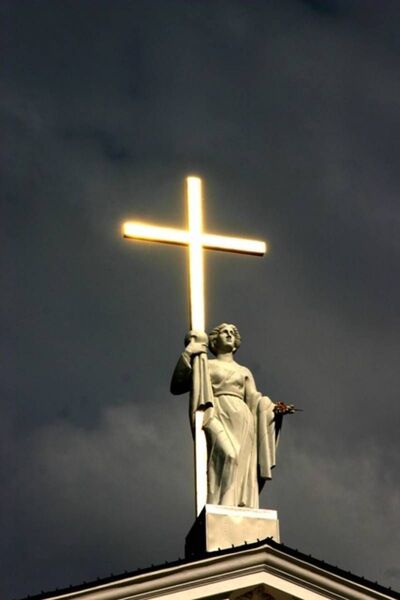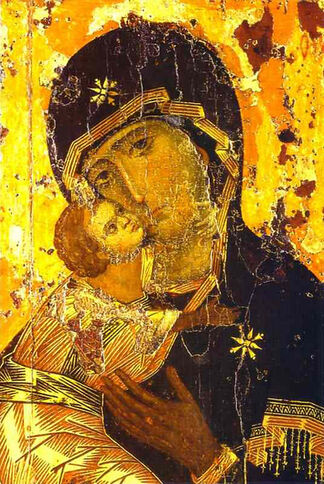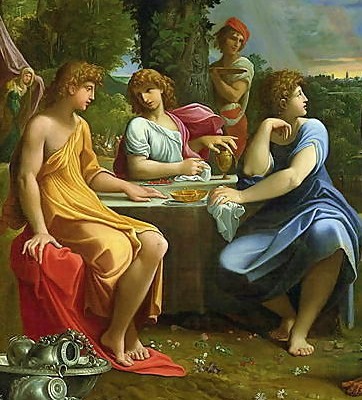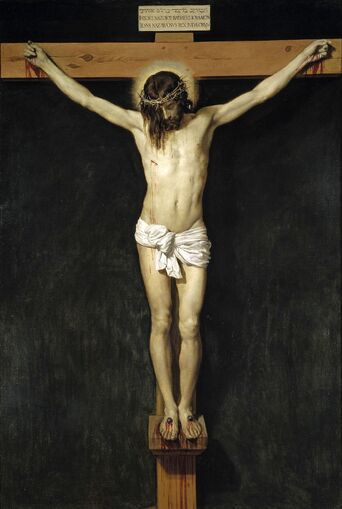
Christianity is a major monotheistic religion on Earth, and is most known as one of the three main religions founded by the life, and death of the three Man Gods.
The Christian religion was founded by Jesus Christ of Nehekhara , and its holy cities along with main spiritual leaders still exist in Nehekhara. The religion and its principles spread throughout the world through the Bible which was a book written by Jesus and passed about and preached by the twelve deciples of Jesus Christ. Christianity has spread to as far west as Nord America, and as far east as Nippon, so it is a truly Global religion, and has the second largest population amongst the organized religions with only Confusionism having more followers.
Christianity is now led by a Council called the Apostles of Jesus Christ, of whom were the loyal commanders of Jesus Christ. While some of the Apostles have fallen their numbers are still high, and they continue to preach the Bible to the Empire of Nehekhara and are a part of the decision process to picking the leadership of Nehekhara.
Christians believe that Jesus is the Messiah prophesied in the Hebrew Bible, referred to as the "Old Testament" in Christianity. The foundation of Christian theology is expressed in the early Christian ecumenical creeds which contain claims predominantly accepted by followers of the Christian faith. These professions state that Jesus suffered, died, was buried, and was resurrected from the dead to open heaven to those who believe in him and trust him for the remission of their sins (salvation). They further maintain that Jesus bodily ascended into heaven where he rules and reigns with God the Father. Most denominations teach that Jesus will return to judge all humans, living and dead, and grant eternal life to his followers. He is considered the model of a virtuous life, and both the revealer and physical incarnation of God. Christians call the message of Jesus Christ the Gospel ("good news") and hence refer to the earliest written accounts of his ministry as gospels.

Jesus with Mary near the time of his birth
Beliefs[]
Though there are many important differences of interpretation and opinion of the Bible on which Christianity is based, Christians share a set of beliefs that they hold as essential to their faith.
Creeds[]
Creeds (from Latin credo meaning "I believe") are concise doctrinal statements or confessions, usually of religious beliefs. They began as baptismal formulae and were later expanded during the Christological controversies of the second and third generation of Christian science.
Many evangelical Protestants reject creeds as definitive statements of faith, even while agreeing with some or all of the substance of the creeds. The Baptists have been non-creedal “in that they have not sought to establish binding authoritative confessions of faith on one another.”[25]:p.111 Also rejecting creeds are groups with roots in the Restoration Movement, such as the Christian Church (Disciples of Christ)out of Armenia, the Evangelical Christian Church in Dagestan and the Churches of Christ located in western Ind.
The Apostles' Creed remains the most popular statement of the articles of Christian faith that are generally acceptable to most Christian denominations that are creedal. It is widely used by a number of Christian denominations for both liturgical and catechetical purposes, most visibly by liturgical Churches of Western Christian tradition, including the Latin Rite of the Catholic Church, Lutheranism, Anglicanism, and Western Orthodoxy. It is also used by Presbyterians, Methodists, and Congregationalists. This particular creed was developed between the conversations of the deciples Joseph, and Hektor. Its central doctrines are those of the Trinity and God the Creator. Each of the doctrines found in this creed can be traced to statements current in the apostolic period. The creed was apparently used as a summary of Christian doctrine for baptismal candidates in the churches of Rome.
Its main points:
- belief in God the Father, Jesus Christ as the Son of God and the Holy Spirit
- the death, descent into hell, resurrection, and ascension of Christ
- the holiness of the Church and the communion of saints
- Christ's second coming, the Day of Judgement and salvation of the faithful.
Salvation[]
Paul of Tarsus, like Jews and Roman pagans of his time, believed that sacrifice can bring about new kinship ties, purity, and eternal life. For Paul the necessary sacrifice was the death of Jesus: Gentiles who are "Christ's" are, like Israel, descendants of Abraham and "heirs according to the promise".[Gal. 3:29] The God who raised Jesus from the dead would also give new life to the "mortal bodies" of Gentile Christians, who had become with Israel the "children of God" and were therefore no longer "in the flesh".[Rom. 8:9,11,16]

Trinity[]
Trinity refers to the teaching that the one God comprises three distinct, eternally co-existing persons; the Father, the Son (incarnate in Jesus Christ), and the Holy Spirit. Together, these three persons are sometimes called the Godhead, although there is no single term in use in Scripture to denote the unified Godhead. In the words of the Athanasian Creed, an early statement of Christian belief, "the Father is God, the Son is God, and the Holy Spirit is God, and yet there are not three Gods but one God". They are distinct from another: the Father has no source, the Son is begotten of the Father, and the Spirit proceeds from the Father. Though distinct, the three persons cannot be divided from one another in being or in operation.
The Trinity is an essential doctrine of mainstream Christianity. "Father, Son and Holy Spirit" represents both the immanence and transcendence of God. God is believed to be infinite and God's presence may be perceived through the actions of Jesus Christ and the Holy Spirit.
According to this doctrine, God is not divided in the sense that each person has a third of the whole; rather, each person is considered to be fully God (see Perichoresis). The distinction lies in their relations, the Father being unbegotten; the Son being begotten of the Father; and the Holy Spirit proceeding from the Father and (in Western Christian theology) from the Son. Regardless of this apparent difference, the three 'persons' are each eternal and omnipotent.
Meaning of the word[]
The word trias, from which trinity is derived, is first seen in the works of Theophilus of Antioch. He wrote of "the Trinity of God (the Father), His Word (the Son) and His Wisdom (Holy Spirit)". The term may have been in use before this time. Afterwards it appears in Tertullian. In the following century the word was in general use. It is found in many passages of Origen

Afterlife[]
Most Christians believe that human beings experience divine judgment and are rewarded either with eternal life or eternal damnation. This includes the general judgement at the Resurrection of the dead (see below) as well as the belief (held by Roman Catholics, Orthodox and most Protestants) in a judgment particular to the individual soul upon physical death.
In Roman Catholicism, those who die in a state of grace, i.e., without any mortal sin separating them from God, but are still imperfectly purified from the effects of sin, undergo purification through the intermediate state of purgatory to achieve the holiness necessary for entrance into God's presence. Those who have attained this goal are called saints (Latin sanctus, "holy").
Christians believe that the second coming of Christ will occur at the end of time. All who have died will be resurrected bodily from the dead for the Last Judgment. Jesus will fully establish the Kingdom of God in fulfillment of scriptural prophecies. Jehovah's Witnesses deny the existence of hell. Instead, they hold that the souls of the wicked will be annihilated.
History[]
Jesus rises[]
Main Article : Jesus
The Bible[]
Taking Nehekhara[]
Growth[]
Major denominations[]
Catholic Church[]
Main Article : Catholic Church
The Catholic Church or as it more commonly known as "The Roman Catholic Church" is a major denomination of Christianity and was founded by the Apostle Mathew of whom travelled to the province of Byzantine and would preach there converting the Italians of Constantinople on masse before moving to Italy and converting the region and through this the entire Roman Empire to Christianity.
The Catholic Church once extended over nearly all of western Europe from Italy across France, Hispania, and England, but following the collapse of Hispania and France the Catholic Church remains dominent in southern Europe as well as outposts throughout the continent.
- Roman Empire
- Denmark (Imperial Empire of Germania Province)
- Kingdom of Poland
- Kingdom of Bretonia
- Kingdom of Dustin
Church of Matron[]
The Church of Matron is a branch of the Roman Catholic Church that controls the region of the Dwarven Empire known as the Imperial Empire of Matron, and once was directly a part of the Roman Catholic Church but following coruption within the Roman Catholic Church they formed their own papacy and while following a near identical doctrine have split from the Roman Catholic Church.
- Empire of Matron
Church of Byzantine[]
See Also : State Church of Byzantine
The Eastern Orthodox Church was founded by the first leaders of the Byzantine Empire as a way of further distancing themselves from the Roman Empire, and it would expand north-west from Byzantine becoming dominent in the Croatian region as well.
- Byzantine Empire
- Kingdom of Georgia
Henophysitism[]
Henophysitism is the overall grouping of those Christian churches centered from the Empire of Nehekhara and constitutes several major Christian denominations in the following.
- Assyrian Church : The Assyrian Chruch was founded by Paul of Armenia of whom following the death of Jesus would return to his homeland in Assyria to the capital of Armenia where he founded the Church of Assyria quickly fanatising the lands of Assyria.
- Kingdom of Assyria
- Nestorian Church : Nestorianism is the original foundation of the Christian Church and founded by several of the Apostles of Jesus it would become the major Denomination of the Nehekhara Empire.
- Empire of Nehekhara
- Republic of Gambia
- Kingdom of Senegal
- Empire of Mali
- Church of Miaphysite : Miaphysitism holds that in the one person of Jesus Christ, Divinity and Humanity are united in one (μία "one" or "single") nature ("physis"), the two being united without separation, without confusion, and without alteration.
- Kingdom of Lahmia
- Sunni Christians : Sunni Christians were founded by the second son of Jesus in the form of Ali of whom sent northward into the lands of the Turkmen would create the church before finally being killed fighting the Uzbeks of the Median Empire.
- Kingdom of Turkmenistan
- Shia Christians : Shia Christians were founded by the first son of Jesus in the form of Andreas of whom assisted by the Apostle Andrew converted much of Persia to the Christian religion and Andreas would continue converting there until executed by the Parthian Empire.
- Satrap of Persia
- Kingdom of Parthia
Minor Henophysitism Churches[]
- Church of Monophysite :
- Church of Ebionites : The Ebionites are a small branch of Christianity only practising in the Realm of Dagestan and the Church of Ebionits is a branch of the Nestorian Church sharing nearly all of the same religious beliefs with the only major difference being they believe that the son of Jesus in the form of Ali was in fact Jesus reincarnated and worship Ali believing him to be the last form of God.
- Realm of Dagestan
- Church of Montanism :
- Church of Apollinarism :
- Church of Alawite : The Hattians are also notably as the founders of the Alawite Christian Branch which is based around the daughter of Jesus named Athalia and through their worship of Athalia they have become an almost feminist movement.
- Hattian Theme